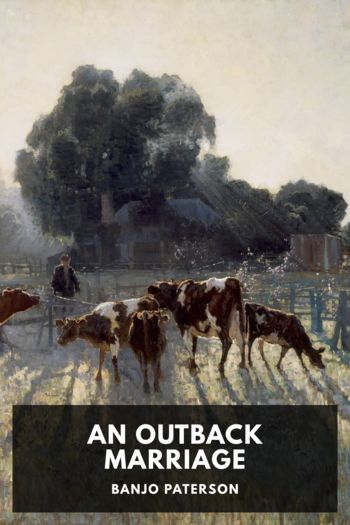The Little White Bird - J. M. Barrie (buy e reader .TXT) 📗

- Author: J. M. Barrie
Book online «The Little White Bird - J. M. Barrie (buy e reader .TXT) 📗». Author J. M. Barrie
And David did some adorable things. For instance, he used my pockets as receptacles into which he put any article he might not happen to want at the moment. He shoved it in, quite as if they were his own pockets, without saying, By your leave, and perhaps I discovered it on reaching home—a tin-soldier, or a pistol—when I put it on my mantle-shelf and sighed. And here is another pleasant memory. One day I had been over-friendly to another boy, and, after enduring it for some time David up and struck him. It was exactly as Porthos does, when I favour other dogs (he knocks them down with his foot and stands over them, looking very noble and stern), so I knew its meaning at once; it was David’s first public intimation that he knew I belonged to him.
Irene scolded him for striking that boy, and made him stand in disgrace at the corner of a seat in the Broad Walk. The seat at the corner of which David stood suffering for love of me, is the one nearest to the Round Pond to persons coming from the north.
You may be sure that she and I had words over this fiendish cruelty. When next we met I treated her as one who no longer existed, and at first she bridled and then was depressed, and as I was going away she burst into tears. She cried because neither at meeting nor parting had I lifted my hat to her, a foolish custom of mine, of which, as I now learned to my surprise, she was very proud. She and I still have our tiffs, but I have never since then forgotten to lift my hat to Irene. I also made her promise to bow to me, at which she affected to scoff, saying I was taking my fun of her, but she was really pleased, and I tell you, Irene has one of the prettiest and most touching little bows imaginable; it is half to the side (if I may so express myself), which has always been my favourite bow, and, I doubt not, she acquired it by watching Mary.
I should be sorry to have it thought, as you may now be thinking, that I look on children as on puppy-dogs, who care only for play. Perhaps that was my idea when first I tried to lure David to my unaccustomed arms, and even for some time after, for if I am to be candid, I must own that until he was three years old I sought merely to amuse him. God forgive me, but I had only one day a week in which to capture him, and I was very raw at the business.
I was about to say that David opened my eyes to the folly of it, but really I think this was Irene’s doing. Watching her with children I learned that partial as they are to fun they are moved almost more profoundly by moral excellence. So fond of babes was this little mother that she had always room near her for one more, and often have I seen her in the Gardens, the centre of a dozen mites who gazed awestruck at her while she told them severely how little ladies and gentlemen behave. They were children of the well-to-pass, and she was from Drury Lane, but they believed in her as the greatest of all authorities on little ladies and gentlemen, and the more they heard of how these romantic creatures keep themselves tidy and avoid pools and wait till they come to a gate, the more they admired them, though their faces showed how profoundly they felt that to be little ladies and gentlemen was not for them. You can’t think what hopeless little faces they were.
Children are not at all like puppies, I have said. But do puppies care only for play? That wistful look, which the merriest of them sometimes wear, I wonder whether it means that they would like to hear about the good puppies?
As you shall see, I invented many stories for David, practising the telling of them by my fireside as if they were conjuring feats, while Irene knew only one, but she told it as never has any other fairytale been told in my hearing. It was the prettiest of them all, and was recited by the heroine.
“Why were the king and queen not at home?” David would ask her breathlessly.
“I suppose,” said Irene, thinking it out, “they was away buying the victuals.”
She always told the story gazing into vacancy, so that David thought it was really happening somewhere up the Broad Walk, and when she came to its great moments her little bosom heaved. Never





Comments (0)